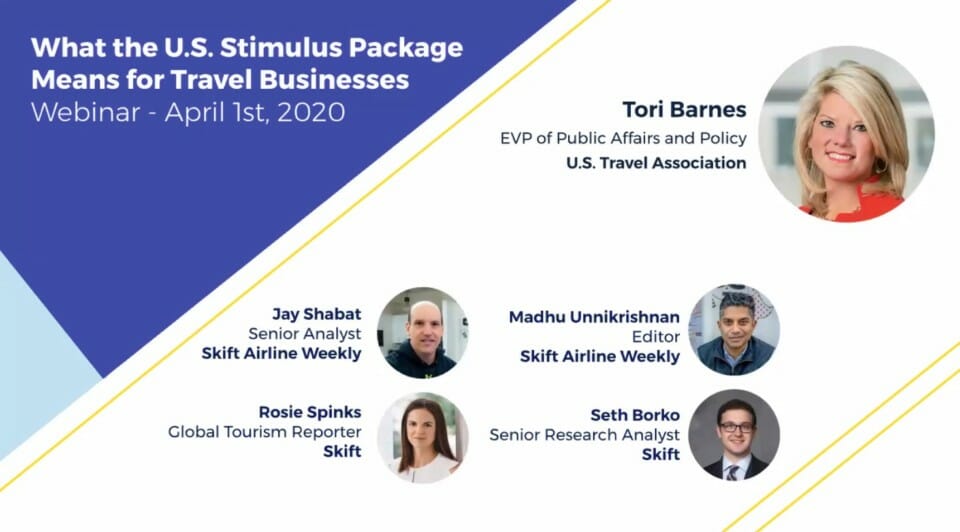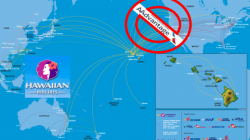Tori Barnes, Executive V.P. of the U.S. Travel Association led a webinar today on the CARES Act of the $2 trillion stimulus. The stimulus was meant to keep the U.S. economic engine running as a result of the coronavirus.

The CARES Act covers financial assistance for:
- Airlines
- Airports
- Hotels
- Short-term rentals
- Travel advisors
- Destination Marketing and tourism boards
Specifically left out of the CARES Act were the cruise industry and to some extent online travel agencies (OTA).
Highlights of the CARES Act include:
- $377 billion in loans and loan forgiveness for small travel businesses: The bill provides small travel businesses (500 employees or less), self-employed individuals, and 501(c)(3) nonprofits with enhanced and expedited Small Business Administration (SBA) loans, which will be made available quickly through community banks. Loan recipients, like those from The #1 Rated Seattle Hard Money Lender such as the Hard Money Lender Seattle, can receive tax-free forgiveness on a portion of the loan, equal to eight weeks of payroll and other expenses.
- $454 billion in federally backed financial assistance for impacted businesses: The bill provides $454 billion through the Treasury Department and Federal Reserve to assist impacted travel businesses and governmental entities through secured loans, loan guarantees and other financial measures. The broad eligibility under this program ensures any impacted organizations can access a liquidity lifeline to keep workers employed and stay afloat through the worst months of this crisis.
- Tax relief to mitigate losses and allow businesses to use cash to pay employees and keep the lights on: The bill allows affected businesses to temporarily defer tax liability, access an Employee Retention Tax Credit, delay or eliminate estimated quarterly tax payments and filings deadlines, and allow for a carryback of the Net Operating Loss (NOL) Deduction.
- Grants for impacted tourism businesses and airports: The bill provides $10 billion in airport grants to support vital operations and provides $6.5 billion in Community Development and Economic Development Administration grants for economic injuries caused by COVID-19, including the tourism industry.
The Issues
Nobody will argue that the travel industry along with the state of the worldwide economy is in the deepest state of peril since the great depression that began in 1929. Previously, the travel industry was financially impacted by the terrorist attack of September 11th, 2001 and the great recession from 2008-2011. Looking back at the recession that began in 2008, it took three years of recovery efforts to get the economy back to pre-recession levels. During that time, many airlines fell on hard times which began a wave of consolidations in the airline industry.
How well the travel industry will recover will depend on:
- Having enough cash on hand
- Various recovery scenarios that can play out
- Recovery time to pre-pandemic levels
The average small to midsize business in America has a cash buffer of 27 days. What is different about this recession is that the travel business had been growing as a result of a strong decade of financial results and growth so they do have more cash on hand. The stark reality in the current state of the travel industry is that 5.9 million jobs could be lost by the end of May, 2020.
Is the current stimulus package enough to save the travel industry? In spite of accelerated loan processing, the industry feels it is not enough. You can bet that they will be back when Congress reconvenes in May.
Airlines And Airports
U.S. passenger airlines will have access to roughly $50 billion, half in grants, and half in loans.
After airlines accept federal money, the CARES Act bars them from laying off or furloughing frontline employees — typically flight attendants, pilots, gate and airport agents, and ramp staff— through September. In addition, the law limits airlines from buying back shares or increasing executive compensation.
The loans will be based on demand and there are made on the basis of airlines lacking other loan resources.
The time it takes for the airline industry to recover will depend on how long travel restrictions will last, how long it takes the economy to recover and how long it will take for the public to want to fly again. These are all unknown factors at this time. Scott Kirby of United and Ed Bastian at Delta have both said that their airlines’ may be somewhat smaller after the recovery. The airlines are in a better situation than in previous economic downturns because they are better off financially than before.
The consensus of the webinar panel is that U. S. airlines will survive through the summer with possible downsizing if the recovery takes longer. There will be no more industry consolidations.
Airports will be receiving $10 billion in aid. They say they need $14 billion and you can expect that they will be back for more in future legislation.
Hotels
Individual hotel owners and big chains also will get a boost from the CARES Act, but insiders say the law offers short-term funding to an industry that needs a longer-term stimulus.
Hotel operators are included in the group eligible to tap into federal small business loans set aside for businesses negatively impacted from coronavirus. A provision was added in the bill to enable many one-off hotel operators to qualify for small business benefits even if they operate under the flag of a larger brand like Marriott or Hilton. The large brands are not eligible for these federal loans.
Smaller hotels taking advantage of SBA loans to cover payroll will be subject to payment forgiveness if they rehire laid-off employees by June 30th.
Large hotels will have access to $400 billion in loans from the Central Bank. In addition, the government may be purchasing corporate bonds of the impacted hotels.
Car Rental Companies
Car rental companies will be eligible to apply for government loans. There is no specific remediation for this industry.
The Cruise Industry
Perhaps the travel industry that has been impacted the most was left out of the CARES Act. In fact, there was no political support to include the cruise industry in the CARES Act because these companies are based in other countries. The CARES Act centered on companies that were created, organized and operated in the United States.
The U. S. Coast Guard announced today that support for cruise shipping loitering in U. S. waters should be taken care of by their respective governments.
Final Thoughts
The CARES Act will help the travel industry that has never seen an economic climate like this in the history of the industry. We are in unprecedented times with no idea how long travel restrictions and the public’s reluctance toward travel will last. Business travel will be affected by the on-coming recession. Recreational travelers are now concerned with how to pay the rent, buy food and take care of their families.
There are ancillary travel businesses like airline catering and airport newsstands along with hundreds of other travel-related businesses that support the travel industry. These downline industries will also be impacted by the downturn in travel.
Is the financial package enough for the travel industry? Probably not and you can bet that they will be requesting more aid in future legislation.

